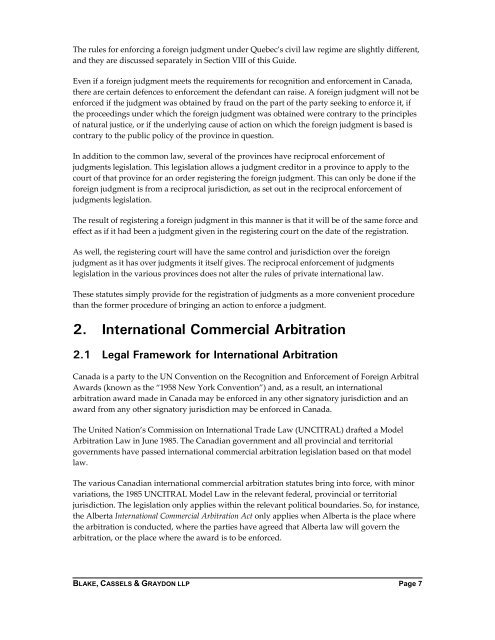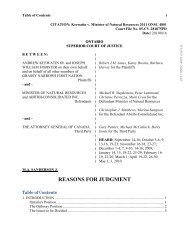Litigation and Dispute Resolution Guide
Litigation and Dispute Resolution Guide
Litigation and Dispute Resolution Guide
Create successful ePaper yourself
Turn your PDF publications into a flip-book with our unique Google optimized e-Paper software.
The rules for enforcing a foreign judgment under Quebec’s civil law regime are slightly different,<strong>and</strong> they are discussed separately in Section VIII of this <strong>Guide</strong>.Even if a foreign judgment meets the requirements for recognition <strong>and</strong> enforcement in Canada,there are certain defences to enforcement the defendant can raise. A foreign judgment will not beenforced if the judgment was obtained by fraud on the part of the party seeking to enforce it, ifthe proceedings under which the foreign judgment was obtained were contrary to the principlesof natural justice, or if the underlying cause of action on which the foreign judgment is based iscontrary to the public policy of the province in question.In addition to the common law, several of the provinces have reciprocal enforcement ofjudgments legislation. This legislation allows a judgment creditor in a province to apply to thecourt of that province for an order registering the foreign judgment. This can only be done if theforeign judgment is from a reciprocal jurisdiction, as set out in the reciprocal enforcement ofjudgments legislation.The result of registering a foreign judgment in this manner is that it will be of the same force <strong>and</strong>effect as if it had been a judgment given in the registering court on the date of the registration.As well, the registering court will have the same control <strong>and</strong> jurisdiction over the foreignjudgment as it has over judgments it itself gives. The reciprocal enforcement of judgmentslegislation in the various provinces does not alter the rules of private international law.These statutes simply provide for the registration of judgments as a more convenient procedurethan the former procedure of bringing an action to enforce a judgment.2. International Commercial Arbitration2.1 Legal Framework for International ArbitrationCanada is a party to the UN Convention on the Recognition <strong>and</strong> Enforcement of Foreign ArbitralAwards (known as the “1958 New York Convention”) <strong>and</strong>, as a result, an internationalarbitration award made in Canada may be enforced in any other signatory jurisdiction <strong>and</strong> anaward from any other signatory jurisdiction may be enforced in Canada.The United Nation’s Commission on International Trade Law (UNCITRAL) drafted a ModelArbitration Law in June 1985. The Canadian government <strong>and</strong> all provincial <strong>and</strong> territorialgovernments have passed international commercial arbitration legislation based on that modellaw.The various Canadian international commercial arbitration statutes bring into force, with minorvariations, the 1985 UNCITRAL Model Law in the relevant federal, provincial or territorialjurisdiction. The legislation only applies within the relevant political boundaries. So, for instance,the Alberta International Commercial Arbitration Act only applies when Alberta is the place wherethe arbitration is conducted, where the parties have agreed that Alberta law will govern thearbitration, or the place where the award is to be enforced.BLAKE, CASSELS & GRAYDON LLP Page 7
















